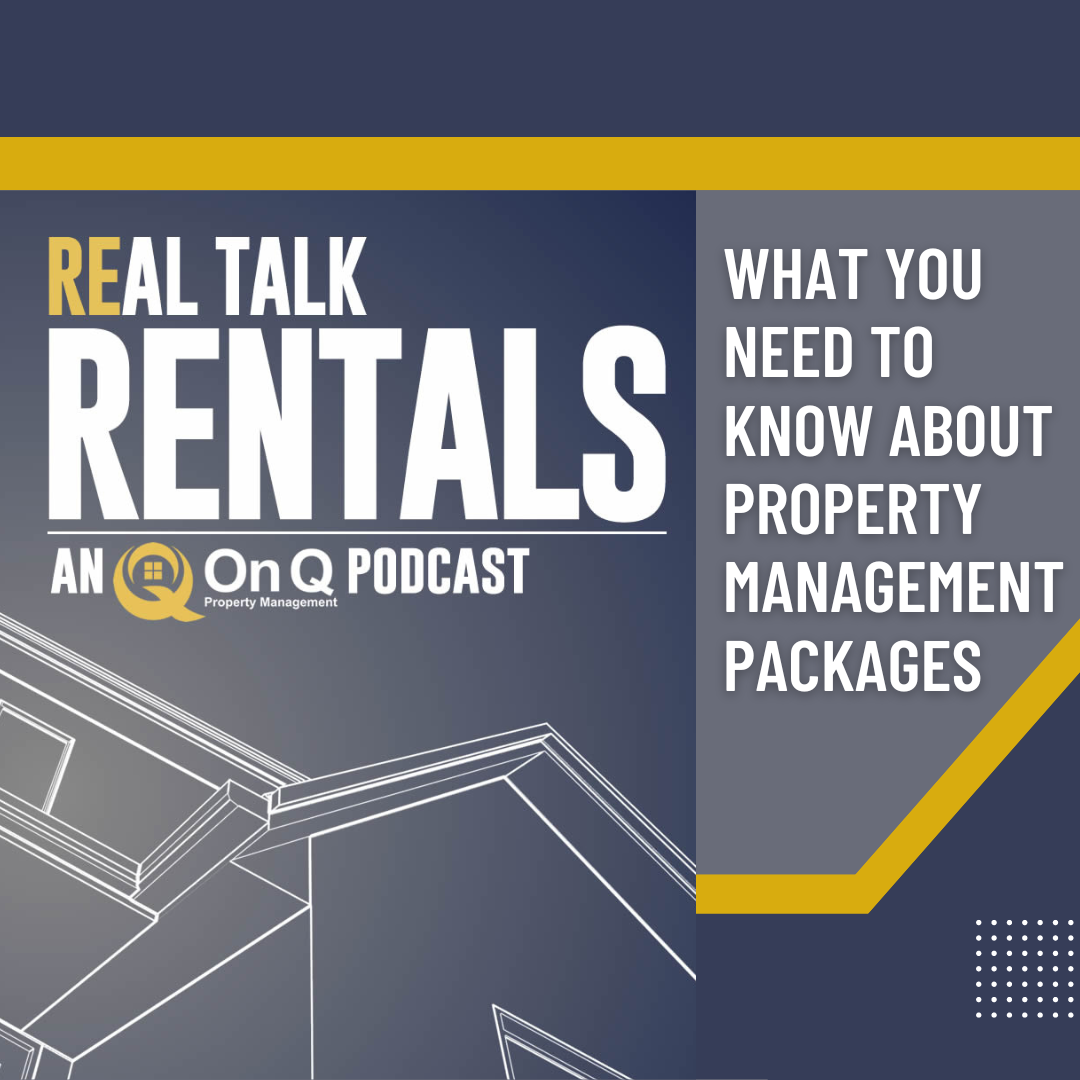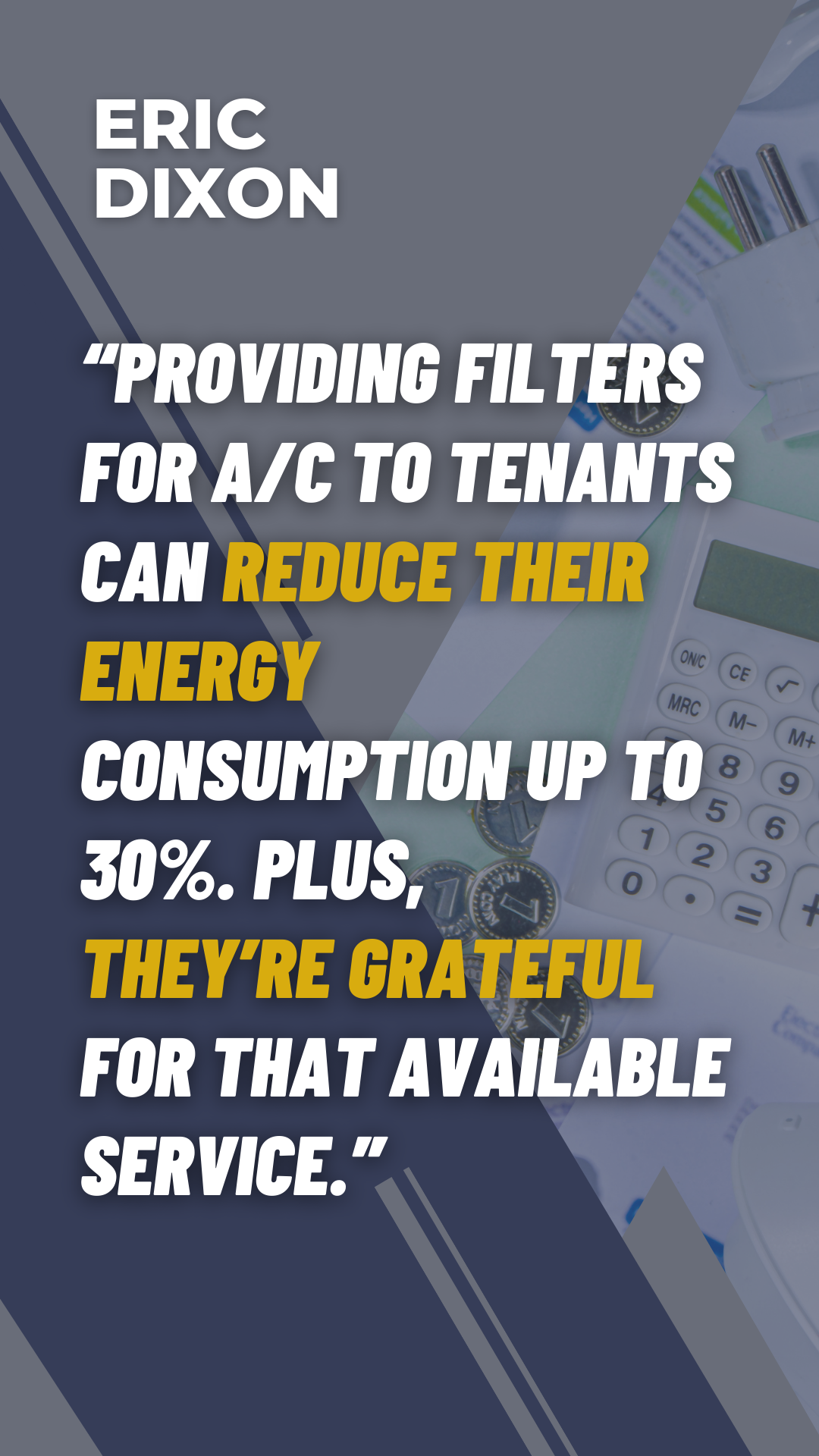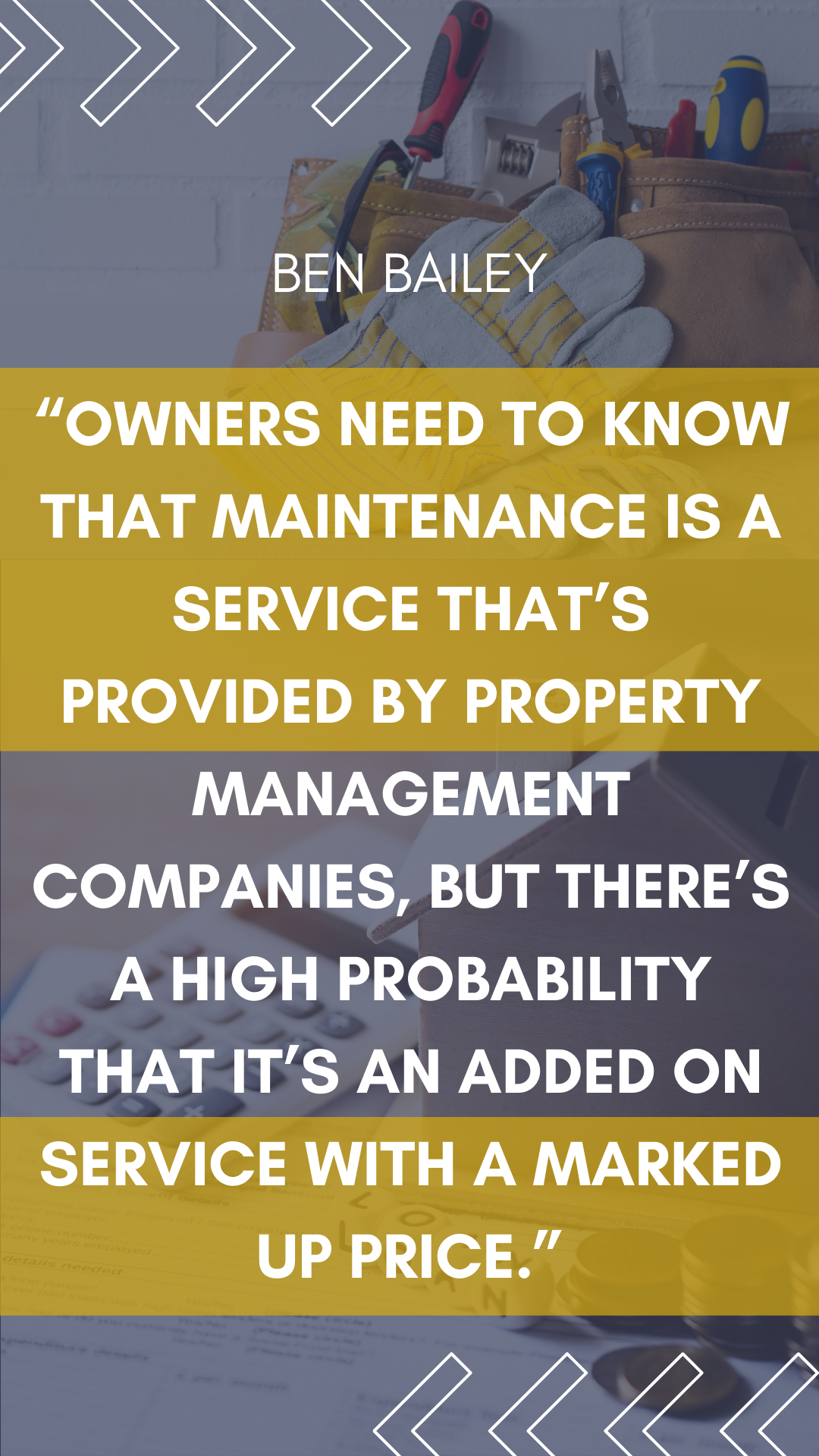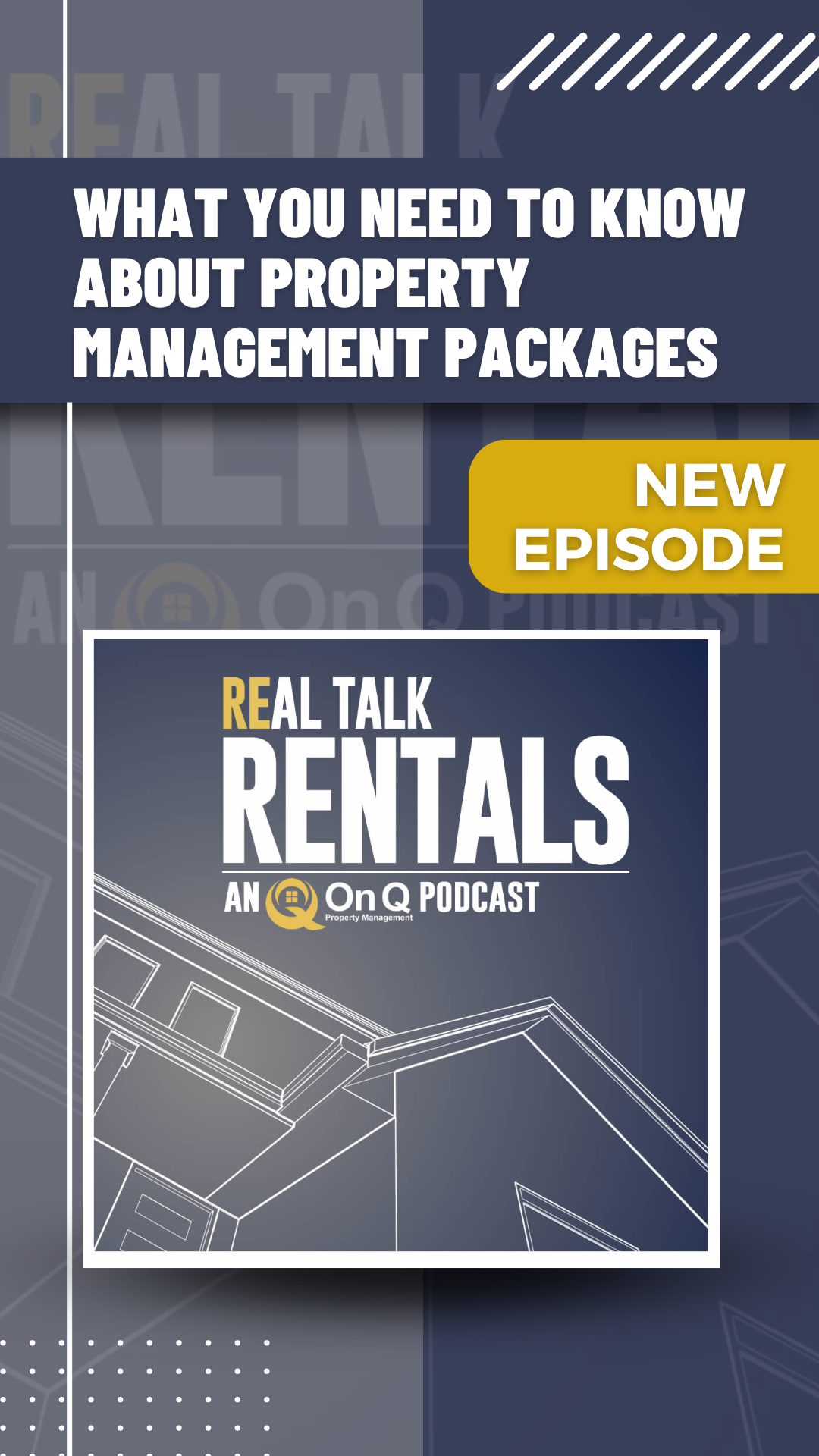REAL TALK RENTALS
Episode 22: What You Need to Know about Property Management Packages
Have you ever wondered what tools and services different property management packages have to offer? In this episode, Ben and Eric break down the pros and cons of all the most popular property management packages and explain what you should consider when choosing the right one for you. From basic maintenance and tenant screening to more advanced financial reporting and marketing strategies, there's a lot to consider when choosing the right package. Tune in to discover more and make the most of your rental experience!
This episode covers:
- Rent Collection
- Maintenance
- Landscaping
What You Need to Know about Property Management Packages
Ben Bailey: Coming up on today's episode of Reel Talk Rentals, we're going to talk about the whole property management package. Welcome back to Real Talk Rentals, a podcast brought to you by Oncue Property Management. We're here to give you all the behind the scenes of what goes into managing a rental property. I'm your host, Ben, With me as always, my co-host, Mr. Eric Dixon, the go to expert on all things property management. And this time in this episode, we're going to be digging into kind of the whole property management package. We're going to be talking about all of the features and services that are available through most property management companies outside of what you generally think of. So let's just start then right there. Eric, I'm going to ask you, let's define the basics. Um, if you're paying a monthly management fee, what should be included in that? None of the upgrades, bells, whistles, just a tenant placed in and you're managing it. What should be included in that?
Eric Dixon: Okay. So yeah, that's kind of your basic package, right, of property management. So I would start with and maybe put the hat of a landlord what their expectation is and what the reality is with it is you're going to collect the rent. So there's the collection of rent aspect, right? It's due on the first. It's late on the third. It's, you know, the five day notice, the eviction process, if it gets to that, all of that, you know, that's included. You've got your facilitating of maintenance repairs, you know, tenant calls in, says there's a leak or there's a, you know, appliance goes out you know, facilitating all of that. Um, I'd say the maintaining of any relationship whether it be so there's obviously the landlord and the tenant and HOA vendor, you know, you're kind of maintaining those relationships. Contractors Whenever I would talk to new clients coming on board, I would always let them know the property manager's job is theirs. I'm the property manager. You got tenant on one side speaking in one ear. You've got the owner speaking in one ear. And it's my job to digest both of these these sides and come up with a solution, Right. And have empathy for both and figure out, you know, what is the best path forward that abides by the lease, gets everything done at a cost effective, you know, in a cost effective way. So it's maintaining that relationship. Um, I would say all of the accounting. So that kind of goes with rent, but it's detailing out all of your income and all of your expenses monthly, whether it's sending by direct deposit or a check, um, you know, a monthly statement, a year end statement, you know, all of the accounting super important.
Eric Dixon: Yep. Um, and I'd say for even a lot of success, very successful investors accounting may be the number one. They're like my tenants pay rent on time, dude. Like, I can handle the maintenance, but I have to find a perfect way to to document all my income and expense and my 1099 and my, you know, all of that, all of that stuff at the end of the year. Um, I would say included in management should be your 24 hour service, I guess we call it we're on call 24 over seven. Sure. But you know, whether if a tenant calls or a tenant sends in a work order, whatever, that you're responsive seven days a week, you know, weekends and nights and holidays should at least have an emergency service of some kind. Um, I was going to say something with with HOAs, but I guess it's just maintaining that relationship. Sure. If there's a two nights ago, I got an HOA notice for one of my renters and I texted a picture of it to my property manager here at the office and said, Hey, can you handle this? Yeah, it was a weed violation, you know, landscape weeds violation, right? And then I would say the I think from there, just providing any sort of market analysis or market update on the market, I would expect my property manager to let me know, you know, whether it be at least renewal. Maybe I call up once a year. I'm like, Hey, how's the market doing? You know, the property manager should have an insight. That's what you're paying for some sort of insight. So I don't know. Is there anything else? I mean, you know, just with the basics of management.
Ben Bailey: Yeah. I was going to say, one of the things you brought up that, you know, we do and I know I'm sure a lot of other companies do the facilitating the maintenance, but there are companies that charge a markup on that. So you need to be aware that some companies might say, we'll handle that, but it's going to be 10% more. Yeah, Yeah.
Eric Dixon: And it actually that's a great point. And it's not even that that's a bad thing, right? It's just the way we're structured is included in the just if you hire us just for the management fee and we're just we're not talking about placing the tenant leasing the house out. We're just saying the tenant lives there. What we handle for the management fee, right, includes maintenance, whereas another company may be like, Hey, that doesn't that's not encapsulated in my management fee. Yeah, we tack on a percentage or a markup or a, you know, whatever the relationship is with, with vendors. There's two well one local company I know of and another one in another state. They just don't do maintenance. And they said, Oh, no, really, people hire us just to do the accounting and the placement of tenant and then the owner does their own. That's wild. I'm kind of like, Why do you have a property manager?
Ben Bailey: Yeah, I would think. I mean, gosh, if.
Eric Dixon: I have the headache.
Ben Bailey: Right, If I was going to hire a property manager, I would want them to get yelled at by the tenant instead of me. Like you said, be that mediary and then handle the maintenance. Those are the two. Everything else, it's like I can work a QuickBooks, Like I'll figure out the accounting.
Eric Dixon: And it's funny, everybody, you say that and then some people are the complete opposite. Sure, dude, I'm super handy. I can text or find any sort of vendor, but I don't know. Accounting. I don't know. Landlord law. I don't know. You know? So it's just interesting, right?
Ben Bailey: Yeah. So mean. Long and short of it is find a company like Oncue that does it all. We do it all within that price point.
Eric Dixon: Um, small plug there.
Ben Bailey: Yeah. Okay. So outside of that and this is really kind of the meat of what we want to talk about today is what are the additional services a landlord should consider. I know when you know, our portfolio managers, our sales guys are talking to people, they're going to give them this plate of options. These are the things available. What are some of those and what are the ones that you think? That owner should consider.
Eric Dixon: Yeah. So let me just start from the top. From I'm putting myself in my brain three, four years ago when I was doing the, you know, these appointments with owners and they would ask, you know, hey, what are the above and beyond or what are the add ons or what are the additional services you offer, Right? Because those different services are going to differentiate depending on what company you go to. So one of the most popular is eviction protection. Um, you know, protects the landlords against the expense of an eviction in the future. So. Right. You know, we, we charge a fee whether it be monthly or annually or however we dice it with the on the on the contract there. But it's a mini it's not insurance, but it's kind of like an insurance policy that's like, hey, you pay a small fee every year. If there is an eviction then we will cover we will bear the expense of that. And we have the relationships with the attorneys and our legal legal staff to, you know, handle that. So eviction protection, one, eviction protection is like 60, 70% of owners, you know, get it. It's very inexpensive.
Ben Bailey: Yeah. Don't know why you wouldn't get it.
Eric Dixon: It just gets the peace of mind and the legal backing to to handle any.
Ben Bailey: Yeah. It's one of those things that you hope you don't need, but you're going to really kick yourself if you do need it. You were like.
Eric Dixon: It's tax deductible anyway, right? It's an expense. But people will ask in the same breath, like your eviction rate must be high if you're selling eviction protection. It's like, no, it's actually very, very low. And that's why the cost is very, very low.
Ben Bailey: And we're also selling it because we're confident in our tenants. Like, you know, yeah, we're so confident that like, we don't think you'll need this. That's a couple of bucks, you know?
Eric Dixon: Exactly. So there's that one. I would say the next most popular is our Hvac. There's kind of into a different bins, right? There's the Hvac filter program. So we will actually go into your home every other month or every or biannually or whatever schedule we're on there with you and we will go replace the filter. So it actually is different than most filter services. They just mail them to your doorstep, which is great. That gets step one is there's a new filter on the premises.
Ben Bailey: There's a reminder.
Eric Dixon: Yep. And then it's up to the tenant, but you're depending on the tenant to put it in, right? So we like our service is more hands on. We'll go when we're doing a routine inspection or when we're just doing a filter change and our, our inspector will bring you the ladder, they'll vacuum it out, they'll replace the filter they take before and after pictures and they make sure that those filters are swapped. And so this one, you have to remember that the the reason to do it is to prevent stress on your AC system. Yeah. And so maybe it will make the lifetime, maybe one or 5 or 10 years longer If you're swapping the filters every other month like you should be. And so there's that. And then the annual Tuneups with the AC is the other bucket. Yeah. And you know, usually we send that out like in March or April to say, hey, tune up your AC before the summer because here in Arizona that thing's running like 15 hours a day or whatever it is. Yeah, at least. Yeah. Dozen hours a day, 20 hours a day to keep up with the with the crazy heat.
Ben Bailey: Yeah. And in other states it's probably the reverse. Where in the winter. Oh, yeah, it's cranking.
Eric Dixon: I was thinking about that because we don't really manage in areas that are super cold, but they probably have the reverse program. Yeah. Before winter, it's like, Hey, get your heaters tuned up, get those right, you know, everything ready, ready to avoid the big repair in the summer or in the winter, you know? So, um, so I would say those are it. A couple things. I just pulled stats off because I thought it was super interesting. We were talking about it yesterday with filters on a nationwide poll. They said that if you replace their filter, so if the owner is providing filters to the tenant and they make sure that they're replaced. So this is assuming that they are replaced at least every quarter, that the Hvac work orders are 30% less, that's insane. So it's like, hey, if you only have an AC order work order every three years, it's like you're going to have one every nine years or whatever that would be. Yeah, I'm horrible at math, 30% less. Um, but if you had three a year, you're going to have two a year or whatever it is. So I just had an Hvac work order yesterday, so it ended up being a fuse which, which was a lot less than something else could have been. And then the next stat that I thought was interesting is the you provide the filters, you make sure they're swapped and the tenants energy consumption is 10% less because the stress on the unit, you know, it's more efficient.
Ben Bailey: So we were talking about this yesterday, but I think I see it all the time in the way people are interacting with us online and leaving reviews and stuff that the the the tenants, the residents and the properties, really, they appreciate it and yeah, they love it. Yeah. And as a renter and I know you were saying as a homeowner, it's it's so easy to forget about that, especially when you're in like a place like Arizona where we're not using it for several months, you know, and it's just like out of sight, out of mind. And I'm not intentionally not changing that. I just don't I forgot, you know, and having someone come and do that regularly makes a huge difference.
Eric Dixon: We literally talked about this yesterday and I told you I had to replace mine. I'm like, They're in my garage. I'm going to do it tonight. I didn't do it last night. Yeah. So.
Ben Bailey: I mean.
Eric Dixon: And and I own. The home and you know, it's my money. If don't do it right. So and I still don't do it. So I can tell you that there are tenants and residents with great intentions to swap their filters every month, and they don't.
Ben Bailey: Yeah, absolutely.
Eric Dixon: So that's a huge one. We we rolled that out a couple of years ago and it's selling like hotcakes and it's not a huge profit center, but it's a awesome service center that provides top tier level service, right. That no one else can offer.
Ben Bailey: And we had a ex-employee who will remain unnamed, but he bet me one time that 90% of tenants change their filters on their own. People do that on their own every month and didn't take him up on that bet. And I should have because I said, Buddy, there's no way. You know, and I know you probably we probably get owners who are like, they'll do it, they'll change their filter. And it's like, Man, don't roll that dice.
Eric Dixon: And a lot of times it's not even financially. It's like, Hey, the filter is inexpensive, but it's going to the store and getting it and it's finding time to do it. You get home from work, it's the last thing you want to do. Yeah, you.
Ben Bailey: Already have them and haven't changed them, right? Yours are sitting at your house 100%.
Eric Dixon: Dude, I'm doing it tonight. That's it. That's it. All right. Um, and then I'd say the only other ones. So we offer routine inspections. So that would be in addition to the move in and move out inspections. This is above and beyond twice a year. So if you're doing a move in, move out and two routines. We're in the home four times in that one year lease. Yeah. Um, and so, you know, it isn't just to get in there and take pictures of the tenants stuff, you know, it's, it's for two things. One is the tenant taking care of it, Are they abiding by the lease? We do a smell check obviously that you can't do from afar. You can check if they have pets that you can't do from afar, but it's for preventive maintenance, Preventive maintenance. Um, I can't tell you how many times, like, they'll go in and take a picture under a sink and be like, Dude, this is leaking. And the tenant had no idea. Yeah, like, oh, I haven't opened that cupboard in months.
Ben Bailey: Didn't even know there was a cupboard down there. Yeah.
Eric Dixon: And so there's that side of it and the tenants love it. They're super respectful. It's scheduled in advance by certified mail. They understand, you know, the process there. Um, another couple just maybe not as big, but roofing inspections and maintenance work similar to Hvac that gets done annually. The roof doesn't need to be inspected annually, but at least every 3 to 5 years. You should absolutely get those roofs inspected and maintained to avoid that catastrophic repair like I had to do last. Yeah, I was gonna say Eric famously.
Ben Bailey: Yes, we've mentioned a couple times.
Eric Dixon: Oh, dude, it still hurts. Oh, and get this. I replaced that roof 100%. Lots and lots of money and just a huge storm last week. It leaked. Yeah, The roofers, they're warranting it. And it's not even a dig at them. Freak accident. Yeah, it was a like a microburst, like, hit in that area and. Yeah, tore up it Anyway, it's just like, it's. It's the story that never ends. And then the last one is just additional services that we can facilitate and offer are things like pest control, pool service, landscape service that we can help get the best vendors there to get eyes and ears on the property every every week.
Ben Bailey: So sure. And that one rolls kind of into the next question because. What I hear a lot is owners saying, oh, you know, landscape, I'll have the tenant take care of that. You know, and again, a roll of the dice, you know. But what, in your opinion, are the typical ones that tenants are responsible for? And is that a good idea? Is it better to keep that? Yeah. In the maintenance in the property management space. Yeah.
Eric Dixon: And so just just piggybacking off the previous with landscaping, it just depends and it's kind of hard. It can't be a yes or a no because it just depends if it's a if it's rock desert landscape, very minimal to do. It's like that's an easy one to put on the tenant. Sure. Even if they don't know how to maintain it, they could hire somebody for super cheap or they could just spend a Saturday every few months and button it up. Right? If it's high maintenance, if it's weekly lawn care, tall trees, lot of shrubs dropping leaves, you know, and.
Ben Bailey: That's going to find you.
Eric Dixon: Like like my yard, my stinking trees in the back drop leaves every winter. And it is a hassle and a mess. If I rent my house out that I live in now, I have to include landscaping, like just you have to the tenant will live there one winter and they'll they'll either be like, Hey, this is horrible. I'm turning the water off and they'll just kill everything. Yeah. Or they'll complain, right? So that one just depends. If it's easy, put it on the tenant. If it's, if it's harder to maintain, include it in rent and get a little, get a little more in rent. You know included pest control is typically always tenant except for things like termites. You know, if there's infestations of some kind, then the landlord steps in and takes care of the infestation if it's not tenant caused. So like termites or not tenant caused if there's bees, nest goes into the attic, you know, tenant caused. No if it's.
Ben Bailey: Unless they're storing honey up there or something.
Eric Dixon: And the what was the other one that, um. Roof rats. Yeah. We, we had roof rats in one of my rentals a couple years ago. And it's like it wasn't the tenants fault that the citrus fell and then all the rats came in the neighborhood and then they lived in the attic.
Ben Bailey: Or a lot of times I have a friend who owns a rental property in my neighborhood and his next door neighbor to his rental house had the citrus trees. Yeah. And it just hit his rental. Got roof rats, you know, And.
Eric Dixon: He's like that nice warm attic.
Ben Bailey: Yeah. And he's like, Now I got to pay to get rid of all these rats because the neighbor wasn't even him, you know?
Eric Dixon: And so something like that, as a landlord, you got to be cognizant of like pest control in general. It's the, the routine ants and cockroaches and crickets and stuff that's on the tenant, but it's the infestations and the random stuff that the landlord still owns up to. Obviously, tenant tenant responsible things are like utilities. Unless it's like a multifamily in our apartment, it's water, sewer, trash, gas, electric. All that's in the tenant's name. Yeah. Um, Internet, cable streaming services. Obviously, that's all in the tenant's name when you're talking vacation rentals, which is a whole different ball game. Sure. Those things you actually keep in your name as the landlord and it's a higher expense. And then you can, you know, you rent out the furnished furnished rooms there. Um, and then the, the other stuff that's kind of its own separate category that will probably have to cover another time is what these packages that you can come up with, whether it's insurance or credit reporting or um, you know, they have rewards programs and different things that companies can offer, right? So we have our own resident benefits package here at our office and it's just we compile the best benefits for our residents. Yeah.
Ben Bailey: And these are, these are services kind of like we were just listing out that would normally be for the landlord. But these are for the these are for the tenant. The tenant.
Eric Dixon: Yeah. And so we've just found over the years that residents are demanding higher level service and offerings. Right? Like don't want to have to go get tenant renters insurance, don't want to have to go get a third party to pay them to report my rental payments to the credit bureau. Don't want to have to, you know, do all they want it to be a one stop shop. And as long as we can offer that high level of service at a good value, you know, they're you know, they love it. So we can talk about that as a yeah.
Ben Bailey: We'll, we'll commit to we'll do it next episode we'll go over the resident benefits package because there was some interesting stuff when we were talking yesterday that just about dollar amounts that people you know by having their credit reported accurately get.
Eric Dixon: Reported when you when you pay rent can help you tenfold in the future.
Ben Bailey: Yeah absolutely insane. Okay so that'll be next episode. So let's do one last question here then. Um. Out of all these extras you listed. Which one would you personally say? Is essential that property owners don't nickel and dime on this one. It's something you need to consider. Yeah, so.
Eric Dixon: The and they've both happened to me personally. So I have a testimony of traumatic it's traumatic and it's PTSD over. Yeah. But it's the annual preventative preventative maintenance. Right. So it's the if you're in Arizona especially, maybe you're in a place that has high usage or high heater usage. Make sure you do annual inspections and tuneups on those units. Yeah. So like here in Arizona, we send it out in March. In April, we send it out multiple times to make sure that every owner knows, like, hey, spend the 1 or 200 bucks now to save 500 or save a thousand or save the cost of this replacement. And really what you're doing is you're kicking the cost of replacement down the road. Yeah, It's like at some point you're going to have to replace every single unit you have right now. But if you can make that, replace that in ten years instead of five years by spending a couple hundred bucks a year, you know, totally.
Ben Bailey: Or replace it at the right time. Yeah. You know, replacing an AC unit right now in Arizona in February, you know, is a lot different than replacing an AC unit in July.
Eric Dixon: Yeah. July on a Sunday morning when it's 110 outside.
Ben Bailey: Yeah. And now you're talking about the the tenant is in a hotel for a week you know, and there's a backlog on how long they can come out and things like that. Whereas if you do this preventative maintenance, maybe they say, Hey, you got to replace this, but it's March, you know, I can do this tomorrow instead of in a week. Yeah.
Eric Dixon: So that preventative stuff will not only save you money, but it's headache and time and all that. Yeah, but piggybacking off of that is roofing inspections. And I wouldn't do those every year. Like I said, you should, even if you need to ask your property manager or just go ahead and get an estimate. I recently did one on my house. My house is ten years old and I'm like, Dude, it's a tile roof. There's nothing wrong with it. Yeah. And they found like eight cracked tiles. All the mortar caps are cracked and they're like, Hey, this is like on its way to leaking. The underlayment is almost exposed all this stuff. And I'm like, What are you talking about? House is ten years old.
Ben Bailey: Could you imagine if you had to buy another roof?
Eric Dixon: Oh, dude, you know, and it's just because I didn't want to spend a few hundred bucks, right? Yeah, Hundreds of dollars later, it's buttoned up and it's good for another five years. Yeah, exactly that. That would say. And then, um, the only other thing I would look at preventive maintenance wise, is between tenants. It's harder when there's a tenant there to check everything, but between tenants, make sure to get a fine tooth comb and do the preventative maintenance stuff. If you've got angle stops that are frozen, swap those out. If you've got, you know, toilet that you've repaired three times, maybe just replace that this sure right and preventatively stay ahead of the curve on stuff and and you will save money you know in the long run it is an investment mindset instead of a, you know, month to month type thing. You got to invest in these things. But I would say preventative maintenance will save you the most money besides vacancy, which we always talk about. Yeah. You know, the the highest cost items. I mean, I'm getting destroyed on maintenance this last like 18 months. Yeah. And a lot of it could have been preventative stuff if I would have stayed ahead of it.
Ben Bailey: Yeah, well, live and learn, right? Yeah. No.
Eric Dixon: I'm learning. I'm learning with everybody else. Yeah.
Ben Bailey: All right, well, that is it for us this time. Be sure to, like and subscribe wherever you listen to your podcast and leave us a five star review if you can. It really helps out. And we will see you next time.
Our Company
On Q Property Management is a full-service Property Management company specializing in managing residential rental properties. On Q's client-first approach - utilizing a proprietary process and set of tools - delivers a more transparent and profitable property management experience. With year-long tenant guarantees and a no-fee cancelation policy, On Q is dedicated to earning you business month after month.
Arizona Designated Broker: Eric Dixon
Texas Designated Broker: Rodney Henson
Texas Real Estate Commission Information About Brokerage Services
Texas Real Estate Commission Consumer Protection Notice











